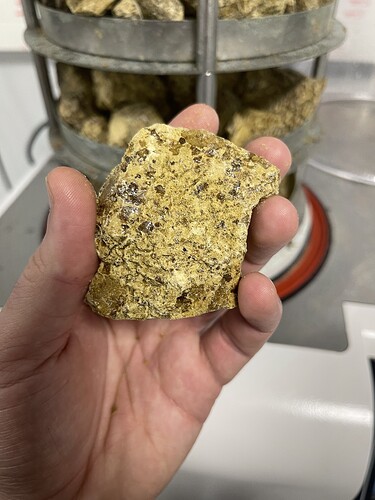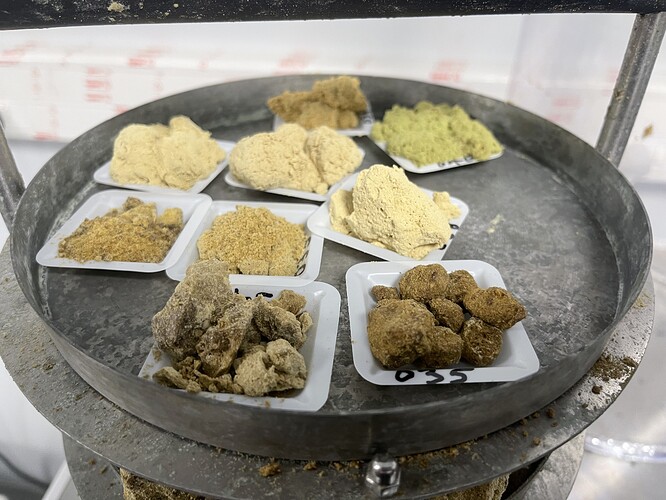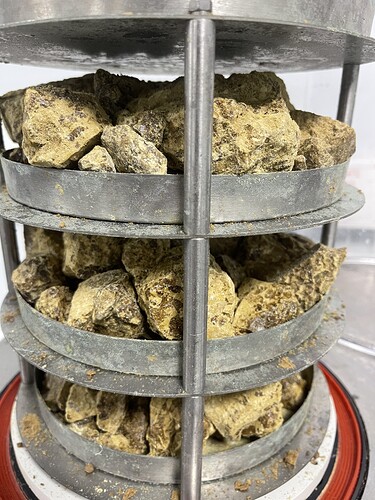We have a farm in Africa, and are looking to scale up. We are looking for the ability to process 5,000-10,000 kg per day wet buds. If anyone has any extraction equipment recommendations they would be greatly appreciated. Our goal is to get this product into an isolate form.
Cbd or else ?
CBD, i am trying to 10x our current capacity and lower the current labor requirements.
If you’re not looking at membranes for winterizing and solvent recovery, you’re starting in the wrong place.
How are you currently getting the job done? Massively parallel works for scaling all kinds of things.
We have the largest and fastest extraction systems in the industry as far as I know and also provide our own solution to heating and cooling that saves hundreds of thousands of dollars per year on electrical or CO2 consumption. By the sound of what you are looking for would be our Behemoth R800 series or possibly a custom design for your facility.
We hold multiple patents on our extraction process and patents pending for our heating and cooling solutions. Our technologies are the only real solution to large scale processing.
With a +50c to -50c typical operational temperature range and the ability to swing 100c in minutes - hot to cold or cold to hot with very little energy consumption. Our systems do not utilize a wasteful hot water heater nor do they require excessive cooling in order to operate. We take advantage of all thermodynamics within the system to maximize the efficiency of the system.
Edit: We have many years of experience working with CBD isolation through the use of our technology. We were also one of the first to isolate bulk CBDa at 97% or better with our Behemoth R600.
Feel free to give us a call at 970-893-2763 for more information.
Ethanol can be tough with wet buds, no? Unless your suggesting using a different solvent with membranes.
You’re recommending light hydrocarbon extraction of 10k kg of hemp a day for CBD isolate production?
You sure water isn’t a more appropriate response?
Hexane, heptane, H2O… can all be recovered more efficiently with membranes.
My ignorance is showing here… People are extracting CBD with H2O??? Are they using alkaline water to form the sodium salt of CBD-COOH, because I was under the impression that didn’t work well.
Yeah suppose it could be, by consuming lye and acid to salt it out and crash it back to a carboxylic acid. I never really liked that method. You also would loose all the terpenes, which have their own value.
Personally, for fresh frozen anything I would go hydrocarbon all day.
Edit: We already have multiple clients run 2000 lbs of dry bio per day through our Behemoth R600 running pure propane… the R800 can do a minimum of 3x more per hour by design. Upgrades available.
I’ll have to look through my bookmarks but I thought I read some people discussing it and came to the conclusion that its inefficient since it pulls too many nasties and purification of the carboxylic acid is a pain and requires use of a nonpolar solvent anyway. But if people have figured out a way to do it efficiently it seems like a no brainer for isolate production.
Yeah you just cold crash it in propane… Was how we got kilos at a time years ago then came up with the idea to make the Rotary Cannabinoid Miner which we also used to crash CBDa with back in the day.
That is definitely not the smartest way to run water extraction.
In my opinion, liquid phase extraction is always going to beat gas phase extraction from a capex and opex perspective when we’re talking tons per hour or day.
My vote on this specific problem would be water or liquid alkanes.
Wet extraction can be done with alcohols and the water pickup remediated in a non-thermal non-dessicant manner, but it’s not the direction I’d generally suggest.
…such as liquid butane or liquid propane… ?
Why deal with all the problems associated with ethanol or water when there are simple solutions that capture everything with cold liquid hydrocarbon (alkane) extraction such as butane or propane?
Membranes for winterization and our tech for solvent recovery and thermal control. ![]()
Agree on this
Screw press the wet biomass to get 90% of the water out
Extract with a screw press type extractor thats continous with something like heptane or hexane
Then winterize and recover most the solvent with membranes, finish off with an FFE
I prefer ambient temperature ambient pressure extractions. Mostly because I don’t like dumping joules into things when I don’t have to… Because joules cost me money.
Last time I checked, neither butane nor propane are liquid at ambient temperature and pressure.
From a capex perspective, heat is cheap and cold is expensive (relatively).
From an opex perspective, they both suck.
I did point out that it’s not the direction I’d suggest.
Why do cold when you can do ambient temperature?
I’ve pointed more than one individual your way as the only butane/propane system that I’d personally invest in if I needed one, partially because your temp control systems are super cool.
But I personally prefer to engineer my systems to not need temp control.
In the stated application of multi-ton daily wet hemp extraction for CBD, I don’t see any reason to believe that any butane/propane system on the market would be the most correct recommendation for the person writing the cheques.
10,000 kg/day wet is not really that big of a throughput, even on an 8 hour day.
Anyone know of a @Loxley system up and running?
Zach we have a R800 en route from a partner in Colorado. To clarify our needs here and the thought process i will explain what we’re working with currently and some of the pros and cons of that equipment.
Herbolea Solvent Free Enzymatic extraction
Pros:
- low energy
- solvent free
- preservation of acidic forms
- ability to run plants wet without any cooling necessary
Cons:
- high consumable cost
- low efficiency (we are seeing the efficiency at roughly 60)
- expensive
Behemoth R800 Hydrocarbon unit
Pros:
- wide SKU range for production
- high throughput
- high efficiency
- low maintenance
- low consumable cost
Cons:
- combustible solvents
- labor needed
- high compliance needs
- energy costs
Both of these machines have merits and faults. What i am looking for now is something much larger that is more geared towards industrial scale.
Here are some pictures of the acidic cannabinoids we’re currently producing.
Not sure what to call this.
The system @Zack_illuminated shared seems pretty cool - but would it work with the utilities and systems readily available on the site?
I would consider that in some places that having the associated utilities and other materials available to do that kind of work may not be easily available.
I would also consider that in some places those processes are not legal because legislators are weird.
We could be pointing @Agri-Cap towards large industrial driers - to get those wet buds more manageable without requiring a bunch of additional utilities and safety measures to make things work.
We could be pointing him towards big vat ethanol - since he wants isolate and he didn’t say anything at all about caring about terpenes or anything else that has been mentioned here.
But regardless of all that - we could have started by asking more questions. So please @Agri-Cap answer these and it will help us lead you towards some options.
How large is your facility?
What kind of utilities do you have access to at your facility? Electrical, HVAC, water, solvent availability?
What are you intending to use your isolate for?
What is your current system? Are you upgrading that or fully replacing it?
What are your current labor requirements?
The photos you show you could totally be getting using a non-solvent process up front and a solvent based LLE refinement on the backend. And yeah, I remember writing a receiving a patent for a process that would get me that cake when running through huge water tanks and then using microfiltration to get the cake. Then what to do with the cake. The water and waste needs were stupid huge and going with ethanol would have been a lot easier.
You could instead be using ambient temperature (think CRT not outside temps) ethanol extraction using membrane filtration for dewaxing and solvent recovery.
- Start with industrial hemp drier - get that water out simple. since you don’t care about anything but the CBD (I assume!)
- Start into ethanol extraction with centrifuge separation of the solvent from the biomass.
- Biomass to compost to get rid of your waste and have a nice byproduct
- Membrane filtration to remove waxes
- Membrane filtration to remove solvent
- Isolation using LLE (if need better purity) repeat solvent removal step
You are only talking about ~4500 dry pounds of material that need to be processed a day. There are plenty of existing off the shelf skids that do this - just pick one that fits your price range and utility requirements.
Feel free to DM if you want to chat about it a bit more.
I would argue that from a capex and opex basis that [edit: if you’re using ethanol] you’re better off not drying the hemp, but instead drying the solvent.
As I mentioned above, there are technologies that enable dehydration of solvents much cheaper and easier than drying your hemp crop.
Ethanol is definitely the simplest and most well-understood route to take on this problem, and an acceptable system could likely be assembled by any number of individuals with relevant experience.
Water would be the cheapest on a capex and opex basis if you only want CBD isolate.


